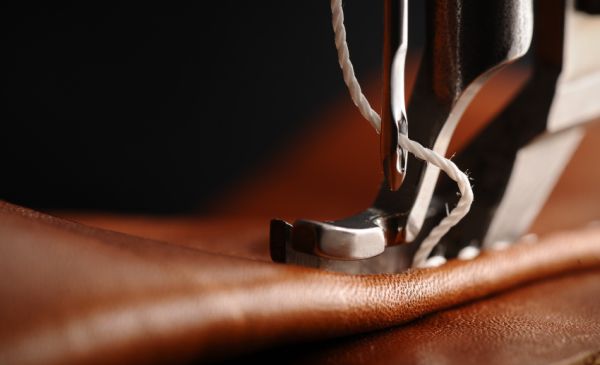English / Bahasa
In my section the workers are all female. We’re part of the sewing section, but we work on special computerised machinery. Each machine is operated by two workers: a day shift worker and a night shift worker. The day shift goes from six in the morning till six at night, while the night shift goes from six at night to six in the morning.
When working the night shift, we get a break between two and three in the morning. Usually I use that time to get some sleep. Our sewing machine sits on top of a large table and underneath it is a large rack on which we place all the sewing materials. In our break we can use this shelf as a bed. Sometimes we take large cardboard boxes from around the work place, fold them up and lay them out on the floor to sleep on.
I find it easy to sleep during that late hour, because usually at that time I’d be fast asleep. When I have my normal day-time working hours, I sleep from ten at night and wake at four or five in the morning. What I do find difficult is trying to sleep after the night shift, from morning to midday.
When I work the night shift, I return home from the factory at around seven in the morning. After returning from work, I help clean the house and do some cooking. From ten to eleven in the morning I have to force myself to sleep, then I wake around two or three in the afternoon, because I have to prepare to go to work once again. In the past I’ve had to take sleeping pills so that I’m able to fall to sleep. It’s not very nice sleeping at that hour because it’s noisy and the air is hot.
If I had the option of doing the day shift all the time, I wouldn’t want that either. I’m aware that because I work the night shift the condition of my body isn’t great—I’m unfit, easily tired and frequently sick. But I do get benefits from rotating between day and night shifts.
Previously, when I always worked day shifts, it was difficult for me to socialise or carry out activities outside work. In the past, just to go to the bank and transfer money to my younger brother, I’d literally have to run there and back because I only had my lunch hour. In the bank I had to line-up, because just like me many others could only visit the bank during their lunch breaks. I wouldn’t even have time to eat. But if I work the night shift, the following morning I can run all sorts of errands outside the house, not only the bank but other things too. So I don’t feel too bad working the night shifts.
If there were something I could wish for, it would be that the factory provides something to help us improve our nutrition, so that I can stay healthy while working the night shift.
Have a question?
I might not be able to respond straight away but I’m happy to answer your questions about my life in Indonesia and my job at the sports shoe factory.
Photo credit: OxfamAUS
Related Indonesian Entry – Bahasa Indonesia
Soal shift pagi dan malam
Di bagian saya, 100 % buruh adalah perempuan. Kami di bagian sewing juga, tapi khusus mengerjakan jahitan yang dioperasikan dengan computer. 1 mesin jahit itu ditangani oleh 2 buruh, buruh shift pagi dan malam. Yang bertugas shift pagi, kerja dari pkl 6 pagi sampai 6 sore, dan yang shift 2 sebaliknya dari jam 6 sore sampai 6 pagi.
Yang shift malam dapat istirahat jam 2 sampai jam 3 pagi. Biasanya, saya langsung menggunakan waktu istirahat itu untuk benar-benar tidur. Mesin jahit kami kan diletakkan di meja panjang, dan di bawah meja itu ada rak besar untuk meletakkan barang (bahan2 untuk dijahit). Kami bisa menggunakan itu sebagai tempat tidur. Kadang-kadang, kami mengambil kardus-kardus besar di sekitar tempat kerja, melipatnya lalu menggelarnya di lantai dan tidur di situ.
Saya termasuk yang mudah tidur pada jam itu, karena memang jam segitu biasanya saya sudah tidur pulas. Yang sulit buat saya justru sepulang kerja shift malam. Saya tidak biasa tidur pagi sampai siang. Kalau kerja normal, saya tidur jam 10 malam, bangun jam 4-5 pagi. Tapi, kalau shift malam, saya pulang dari pabrik sekitar jam 7. Pulang kerja, saya membantu membereskan rumah dan memasak. Jam 10-11 pagi saya harus paksakan tidur, lalu bangun sekitar jam 2 atau 3 sore, karena harus siap-siap untuk berangkat kerja lagi. Pernah saya sampai harus minum pil tidur supaya bisa tidur jam segitu. Tidak enak sebenarnya, tidur jam segitu, karena udara panas, dan berisik sekali.
Tapi, kalau disuruh memilih untuk masuk kerja shift pagi terus, saya juga tidak mau. Saya sadar, kondisi tubuh saya tidak fit, dan gampang capek, mudah sakit, sejak saya bekerja shift malam. Tapi, ada bagusnya buat saya kerja bergantian shift pagi dan malam. Kalau dulu, waktu kerja pagi terus, susah buat saya bersosialisasi dan melakukan kegiatan lain selain bekerja. Dulu, untuk mentransfer uang ke adik saya saja, saya harus berlari-lari pergi dan pulang dari bank, karena cuma memanfaatkan waktu makan siang. Di bank harus antri, karena banyak orang yang sama dengan saya, yang hanya bisa ke bank waktu istirahat. Saya sampai tidak makan siang. Tapi, kalau shift malam, paginya saya bisa melakukan banyak hal di luar rumah, tidak hanya urusan bank, yang lain-lain juga. Jadi saya tidak keberatan bekerja shift malam.
Mungkin kalau bisa berharap, pabrik dapat menyediakan sesuatu untuk memperbaiki gizi kami, supaya bisa tetap fit biarpun kerja malam.
Foto: OxfamAUS



